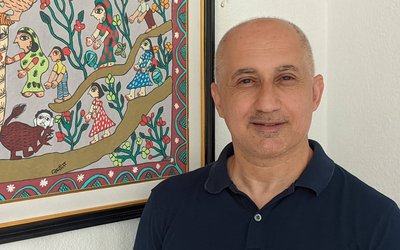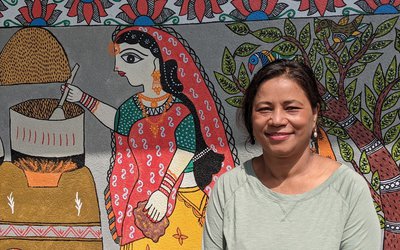After staying in Nepal for over three years, HaengLan JO, Resident Representative, KOICA, Nepal Office, is leaving the country. Having worked extensively with various development offices, Resident Representative Jo knows the ins and outs of Nepal. She spoke to New Spotlight on various issues.
As KOICA has been supporting Nepal for the last many years, how do you see your support to Nepal?
For sure, KOICA has been in Nepal for decades, however KOICA's significant involvement in Nepal's development has started since a few years. Even though, in terms of budget volume, KOICA's support may seem to be smaller as compared to other bilateral aid agencies, nevertheless KOICA has been continuously cautious in channeling its development aid for Nepal. In addition, KOICA's strong merit is we are the generation to observe and experience by ourselves the whole development process of Korean success of economic development. Now we are seriously concerned on how to apply our experience and know-how well to our partner countries like Nepal based on the local context. KOICA always aims for meaningful engagement which can create multiple impacts, and leads to positive contribution in plural societies.
Which are the areas of KOICA's priority in Nepal?
KOICA's priorities are guided by the KOICA's Country Partnership Strategy (CPS) prepared in 2013 where priority areas of development cooperation for the period of 2013-2015 are mentioned: (i) Education (ii) Health (iii) Agricultural /Rural Development. These areas have been finalized in alignment with Nepal's development strategies, needs, its challenges and Korea comparative strengths to address those development challenges and needs.
As large numbers of Nepalese government officials have been visiting Korea for short term and long term training, what are they taught in Korea?
Yes, very true. Human Resource development is one of the prominent areas of KOICA's support in Nepal. As of now more than 1100 government officials have taken part in various KOICA's Capacity development programs entitled as CIAT (Capacity Improvement & Advancement for Tomorrow) Programs.
The CIAT Program provides opportunities to gain first-hand knowledge of Korea's development. Most of these programs are designed to share Korean development experience in the specific field and enable the participants to apply what they have learned for the development of their home countries. Similarly, we also have special CIAT program which is called country specific program that is designed to cater to specific needs and requirements of Nepal. We always make sure that we design such a program where Korea has a comparative advantage. However we work very closely with Ministry of Finance and other relevant government bodies here while finalizing a program for Nepal. There are wide ranges of topics in the Program, including public administration, economic development, science and technology, agriculture and health, renewable energy, human rights etc. In order to meet the changing needs of Nepal, KOICA always strives to renovate and improve its capacity development programs.
What is the level of KOICA's support to Nepal?
Again, as I have already said KOICA is more focused on meaningful engagement, so our activities or projects vary from local level to regional and even to national level. Even though KOICA's priority sectors are mainly three; health, education and agriculture but while designing the project activities, we try to make sure that its immediate and long term impacts expand from the target area and ultimately contribute to the national development goal. Therefore, KOICA always tries not to limit its project output within the certain level but our efforts are focused to create an impact that can be easily owned by the government system and has plenty potential for future replication.
How do you see the role of Korean volunteers in Nepal?
Korean volunteers come from different vocations. Some are nurses, ECD (Early Childhood Development) teachers, IT (Information Technology) specialists, social workers, etc. They are focused on not only transferring their skill but also promoting a sustainable development in the grass root level. I believe that their role has become more vital after the earthquake. They play the role of pacifiers who can help soothe the post disaster environment. Furthermore, volunteers from different fields like social welfare, education can provide various trainings to the affected people, especially children. Besides, Korean volunteers are not only able to help the affected but I believe that in return they are also able to learn a lot about life and themselves as well from volunteering experience in Nepal.
How many volunteers are in Nepal and how many districts are they covering?
There are 41 volunteers who are dispatched in and around 11 districts in Nepal. Currently you can find them actively serving in Baglung, Pokhara, Lamjung, Dhading, Nuwakot, Kathmandu, Kavre, Chitwan, Rupandehi, Kapilvastu & Kailali.
As KOICA has been giving high priority to Nepal, how will KOICA support the post earthquake reconstruction?
The Government of South Korea has taken a serious note of the earthquake that struck Nepal on April 25 and thereafter. Korean people in general deeply sympathize with people of Nepal. So to respect this, Korean government through KOICA has announced approximate 10 Million USD for Nepal's reconstruction separate from emergency relief amounting to 1.5 Million USD right after the disaster. The budget is anticipated to be mainly utilized in health sector.
How do you see your tenure in Nepal?
I enjoyed a lot not only working but also living. Specially working with Nepalese including government and private sector was wonderful experience for me. Its my second mission (I worked in Sri Lanka between 2005-2008), but first time as a Country Director. As a country director I tried many different programs such as drastic increase of collaboration with other donors including UN agencies and GIZ, extension of involvement of participation level from government, implementation our program through KOICA's project office like our NHISP office for Health Insurance Program and HIM office for Mugu Health Program. The most impressive experience in Nepal is working with my KOICA staffs. All of them are excellent and adorable. I got to know the most precious resource of Nepal is its Human Power through my 3 years experience. I respect Nepalese for their intelligence, wisdom, dignified attitude and manners. With the institutional development can be ensured, I hope Nepal can be another success model of land-locked country based on its human resources.
KOICA has also supported to prepare Lumbini Development Master Plan. What is the state of the plan?
You are right. KOICA has supported to develop a master plan which is known as 'Master Plan for Lumbini World Peace City'. KOICA has thoroughly interacted and discussed with the local level stakeholders and the central level government ministries and experts on Lumbini while making this master plan. There were a series of seminars where the experts' opinions were gathered to incorporate while finalizing this master plan. At the moment, the master plan has been fully prepared and submitted to the ministry of culture, tourism and civil aviation, which will be sent to the council of ministers for the formal endorsement and ownership of the master plan by the government of Nepal. We are waiting for this.
- TANAHU HYDROPOWER PROEJCT: A Significant Achievement
- Apr 15, 2024
- AMBASSADOR HANAN GODAR: Sharing Pain With A Nepali Family
- Mar 30, 2024
- VISIT OF KfW AND EIB TO NEPAL : Mission Matters
- Mar 25, 2024
- NEPAL BRITAIN SOCIETY: Pratima Pande's Leadership
- Mar 24, 2024
- NEPAL ARMY DAY: Time To Recall Glory
- Mar 15, 2024
















